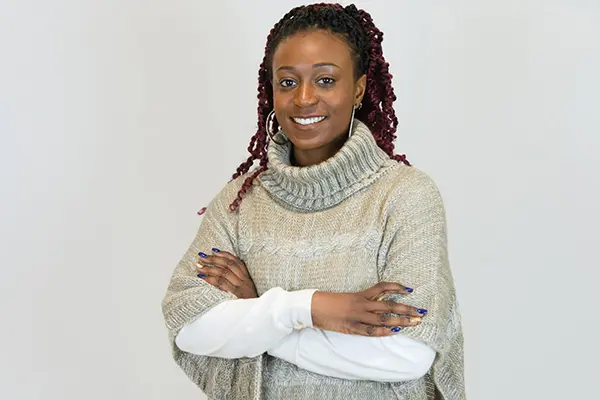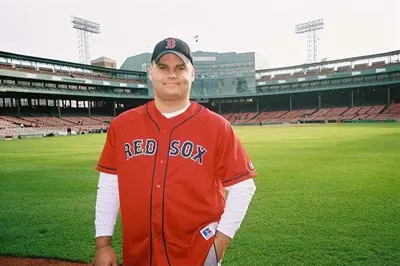Fiona Bruce-Baiden Pushed for Change as Student Leader
 Image by Courtesy
Image by Courtesy
06/04/2021
By Katharine Webster
When Fiona Bruce-Baiden ’21, still wearing her graduation gown, walked into a restaurant to celebrate with her family shortly after Commencement, other customers joined in the applause and cheers.
Little did they know how much she had accomplished beyond earning a degree.
For her selfless and thoughtful leadership in student organizations and her advocacy for students of color, Bruce-Baiden was recognized by the Massachusetts Department of Higher Education as one of “29 Who Shine,” an award given annually to one student from each of the state’s 29 public colleges and universities. Bruce-Baiden was nominated by Amy Liss, senior associate director of Multicultural Affairs, and backed by university leaders.
“I was really surprised and honored to get the award,” Bruce-Baiden says. “It’s good to know that people see that potential in you and believe in you.”
A first-generation college student whose parents immigrated from Ghana, Bruce-Baiden majored in political science and minored in graphic design after studying graphic communications at Blue Hills Regional Technical School in Canton, Massachusetts. She came to UMass Lowell because it had strong programs in both disciplines.
Once on campus, she got a work-study job at the Lowell TeleMedia Center, where she helped with graphics and promotion. During her junior and senior years, she worked in the university’s Office of Multicultural Affairs, where she served as a peer liaison to student organizations after undergoing training as a diversity peer educator.
She also served on the executive board of the Association of Students of African Origin all four years and as president her last two years. She says the club, which includes students with ties to Ghana, Nigeria, Cameroon, Burundi, Somalia, Kenya, Tanzania, Haiti and other countries, became a home on campus for her.
“I’m Ghanaian, and having the opportunity to express that culture at school, I never had that before,” says Bruce-Baiden, who grew up in Randolph, Massachusetts. “It was extremely impactful for me to meet so many people with similar backgrounds and cultures and stories and to be part of a community. I was just really dedicated to the organization and I felt so connected with all of the students.”
But she would do even more. Last summer, during nationwide Black Lives Matter protests set off by the death of George Floyd, Bruce-Baiden convened other Black student leaders on campus from the Black Student Union, the National Society of Black Engineers and the Haitian American Student Association (now the Students of Caribbean Ancestry) to advocate for greater racial justice efforts on campus.
“I wanted to get the Black-identified groups to join together and have a town hall, Uniting Our Voices, to see how students were feeling and how we could help,” she says. “And from there, we just kept going.”
 Image by Courtesy
Image by Courtesy
With assistance from Assoc. Director of Alumni Relations Reja Gamble, Assoc. Director of Multicultural Affairs Francine Coston and College-Based Advising Coordinator Shontae Praileau, the students formed the Black Leadership Advisory Council (BLAC) to take those student concerns and work with the university to address them.
BLAC developed a strategic plan and set up four task forces to work on bringing more diversity to the curriculum and faculty hiring, among other issues. Its leaders meet regularly with Brenda Evans, dean of Student Affairs and Event Services, and Leslie Wong, director of Multicultural Affairs, and they also serve on the university’s Diversity, Equity and Inclusion Task Force.
Helping to establish BLAC was the culmination of Bruce-Baiden’s growth at the university. She came to UMass Lowell intent on becoming a lawyer. But as many of her classmates began to study for the Law School Admission Test and pursue a concentration in legal studies, she hesitated.
“I felt like I couldn’t commit to it fully, and I had to stop and reflect and think about why. I realized I was interested in how communities can be improved through public policy and community engagement,” she says. “And the more time I spent on campus as a student leader and listening to students and stories about their lives, I thought maybe this would be a direction I could go.”
She switched her concentration to American politics. Then, wanting to learn more about policy and the legislative process, she applied for and got an internship in the office of U.S. Sen. Elizabeth Warren. She spent fall 2020, during the COVID-19 pandemic, doing research on nonprofits and responding to constituents trying to access business, housing, unemployment and immigration assistance.
“It was a very trying time to work in that office,” she says. “But I definitely learned a lot about how the different roles and responsibilities within the office come together.”
Already a member of Omicron Delta Kappa, a national leadership honor society, Bruce-Baiden capped her senior year by being inducted into Pi Sigma Alpha, a political science honor society. Now, she’s working as a legislative aide for Massachusetts state Rep. Kenneth Gordon, a Democrat. In the future, she plans to go to graduate school to study public policy and then work as a policy analyst.
At UMass Lowell, she says, she gained the skills and confidence to be a thoughtful leader, thanks to Liss and other mentors in Multicultural Affairs. She’s also grateful to many of her political science professors, who advised her as her interests changed and she began to consider graduate school.
“It helps a lot to find a mentor,” she says. “Amy is wonderful. I think a lot of opportunities opened up for me after getting to meet her. I’m truly so appreciative and thankful for everything she’s done for me, and for my political science professors for helping me understand what I could do next.”




